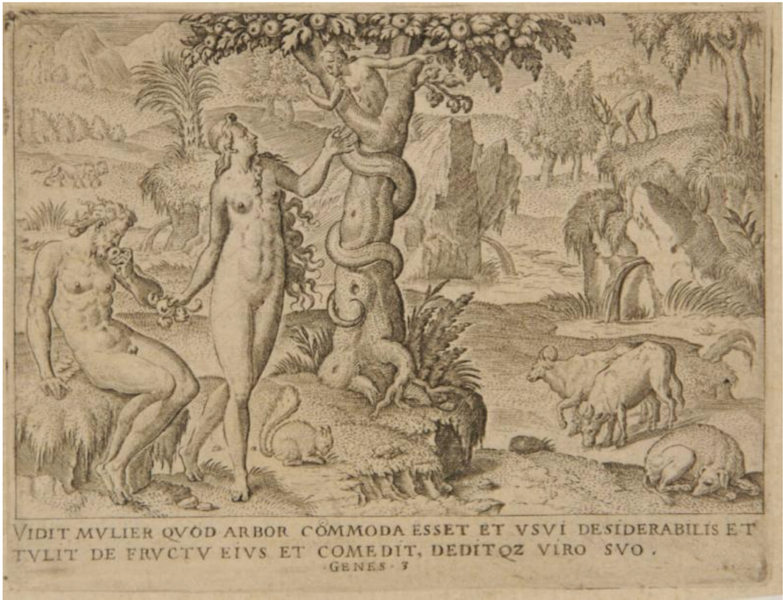It’s a hard time to be Catholic, but when have the times ever been easy? Still, I wish to recommend a course of action, or a habit of mind, to those among us who are apt to grow discouraged, hearing the ax laid to the temple door. Consider this verse, which I translate from the Hebrew: “And they were both naked, the man and his woman, and were not ashamed. And the serpent was shrewd, of all the living creatures of the field which the Lord God had made.” (Genesis 2:25-3:1)
Years ago, a generous Christian, hearing that I was interested in learning Hebrew, gave me one of his Hebrew Bibles. And as I made my slow way through Genesis, I saw he had circled two words here, ‘arummim and ‘ārum, the first one plural, the second singular, and otherwise almost identical. The first means naked; the second, shrewd, crafty, subtle. They are near homonyms and near opposites, and the sacred author, who had the soul of a poet, set them side by side.
Sometimes it’s good to be ‘ārum, for “a prudent man [’adam ‘ārum] conceals knowledge, but the heart of fools proclaims foolishness.” (Proverbs 12:23) Saul’s envy drove David into hiding, so the king told the Ziphites to find David’s hideout and to reveal the identities of those who had seen him, “for it is told to me that he has become quite shrewd.” (1 Samuel 12:23)
We sense in the proverb what we see plainly in the account of David, that we must be shrewd because the world is fallen. So our Lord instructed the disciples, whom he was sending as sheep among wolves, to “be as wise as serpents, and as harmless as doves.” (Matthew 10:16)
We are to guard against men who seek our destruction, while we bring the Gospel to those who will hear it, and in this subtle way, we will be unacknowledged friends sowing good wheat among the tares of the world.
But if we return to Adam and Eve in the garden, we see foolishness, not shrewdness. The serpent’s ruse is to persuade Eve that the Creator is so stupid as to place in the center of the garden a tree that will overturn his intentions; that their Lord was himself a snake, lurking and hiding; that He lied when he said that if they ate the fruit they would die; and that He was powerless to prevent their becoming “like the gods.”
All this appears crafty enough, though really rather banal, as if the serpent could denude the tree of God’s providence and wisdom. The serpent is the first reductionist. While he praises the tree for its supposed power to confer wisdom, he reduces God to a rhetorical trickster and wisdom itself to a commodity you can gain by material means. Adam and Eve are thus the first idolaters, who say in their hearts, “God is not here to notice,” which is ultimately to deny that He is God at all.
When their eyes are opened, they notice they are naked, and that brings shame and fearfulness into their hearts. The same Adam to whose wisdom God had submitted the naming of the beasts – and the word shem, name, so often expressive of sanctity and solemnity in Scripture, is predicated first of Adam’s naming – is reduced to cowering.

When he and the woman hear the voice of God – the first hearing in Scripture – they hide, even with the loincloths they have sewed out of fig leaves. “I heard your voice in the garden,” says Adam, “and I feared, for naked was I, and I hid myself” (Genesis 2:10; ‘ārum ’anochi, with heavy emphasis on both the adjective and the personal pronoun, whose first usage is here).
God is no miser of wisdom. He wants us to grow wise, but we do so by heartfelt obedience and deeper meditation upon his word, which, unlike the serpent, does not reduce, does not dismiss, does not envy.
Had God wanted us to remain barren of fruit, naked to the winds, he would not have made us in his image or blessed us with the command to increase and multiply, and fill the earth and subdue it, and to exercise rightful dominion over all living creatures.
We must always assume that there is more to his words, more to his judgments, never less. “For as the heavens are higher than the earth, so are my ways higher than your ways, and my thoughts than your thoughts,” says the Lord. (Isaiah 55:9)
By this measure we can tell a genuine development from a corruption, to take a cue from John Henry Newman. The corruption, once you go behind its fancy trimmings, tends to the banal, the reductive.
“Only” is its favorite adverb. Jesus supposedly chose twelve men as his apostles, not six men and six women, only to bow to the culture; which makes our Lord out to be timid and a trimmer. Jesus spoke about the fire that burns forever, only as a warning, not sincerely; as if he wanted to make our flesh crawl into obedience.
Corruptions often flare up in opposite ways, as Jesus is supposed to condemn the ownership of property, or to help us be complacent about wealth. The social-only gospel has marched right into the most antisocial position imaginable, which is that marriage is a merely personal contract between two human beings, having to do with their emotional health and perhaps with a desire to bear or to adopt a child or two.
Real development is like what happens to the mustard seed, for with God, simplicity and infinite mystery are one. It is good to be naked before him, as Job was when he acknowledged that he had all things from the Lord, and it is good to pray for wisdom, that comes not from rejecting or dismissing or belittling the least of his words, but from waiting and listening, as Adam and Eve forgot to do.

















